
As tensions between Israel and Iran reached a boiling point recently, a surprising development emerged beneath the surface of the missile exchanges and retaliatory attacks. While both nations suffered significant damage in the conflict, what stood out was Iran's sudden and formidable missile capability, raising the question — how did a nation grappling with decades of sanctions manage to strike so hard and so precisely?
The answer lies in a hidden alliance — one that doesn’t openly take the battlefield but arms its partners from the shadows. That ally is China.
On January 22, 2025, the Financial Times published an explosive report revealing how China had clandestinely assisted Iran's missile program. According to the report, China shipped a massive consignment of 1,000 tons of sodium perchlorate — a chemical compound used to produce solid rocket fuel — to Iran’s Islamic Revolutionary Guard Corps (IRGC).
The shipment arrived in Iran via two Iranian vessels, MV Globan and MV Zayran, at the port of Bandar Abbas. These ships, reportedly owned by the Islamic Republic of Iran Shipping Lines (IRISL), are known to operate under U.S. sanctions and are linked to the IRGC, which oversees Iran’s missile development efforts.
What makes this shipment significant is its potential: the sodium perchlorate can be chemically processed into 960 tons of ammonium perchlorate, a compound that forms 70% of solid rocket propellant. This would allow Iran to produce approximately 1,300 tons of propellant, enough to manufacture 260 medium-range ballistic missiles, such as the Khaibar Shekan or Haj Qamosh.
The Khaibar Shekan missile, with a range of up to 1,450 kilometers, is capable of striking major Israeli cities like Tel Aviv and Haifa. Its deployment in such large numbers has dramatically altered the balance of power in the region.
According to security officials in the West, the two cargo ships carried dozens of 20-foot containers loaded with the material. They departed from Taicang Port, near Shanghai, and reached Iran after a three-week journey. The payload was reportedly intended for the IRGC’s Self-Sufficiency Jihad Organization, the body responsible for overseeing Iran’s missile and defense innovations.
China’s foreign ministry denied knowledge of the specific shipment and argued that sodium perchlorate is not a controlled substance. However, experts believe this transfer is not a coincidence or a case of naïve trade — it’s part of a long-standing strategic relationship that dates back to the 1980s. Over the decades, China has provided Iran with not only missile blueprints but also components and know-how.
This clandestine cooperation came into play during the recent Iran-Israel conflict, where Iran demonstrated exceptional missile capability. It carried out direct strikes not only on Israeli targets but also on U.S. military bases in the region. While Israel responded with force, including airstrikes targeting Iranian nuclear and missile facilities, what stood out was Iran’s boldness and confidence — a reflection of how secure and stocked its arsenal has become.
In one past instance, Israeli strikes had destroyed 12 planetary mixers, which are crucial for mixing rocket fuel, at Iranian missile facilities. However, China’s continuous supply of raw materials like sodium perchlorate has allowed Iran to quickly replenish its stockpiles and remain combat-ready.
Furthermore, many of Iran’s anti-ship cruise missiles are direct copies of Chinese missile designs, underlining Beijing’s sustained role in shaping Tehran’s defense strategy.
Despite its direct role in enabling Iran’s military strength, China has carefully maintained a diplomatic façade. When Israel launched retaliatory strikes or when key Iranian nuclear scientists were assassinated, China issued only condemnations and expressions of concern — never direct military support.
This hands-off, yet hands-deep strategy enables China to expand its influence in the Middle East without direct confrontation. It supports Iran as a regional counterbalance to the U.S. and Israel while also backing Pakistan, another adversary of India, thereby strengthening its broader geopolitical hand.
China’s strategy of empowering countries like Iran and Pakistan should raise alarms across Asia — particularly for India. Over the years, China has armed and supported Pakistan’s defense capabilities and intelligence networks. The same playbook appears to be in action with Iran.
This three-way axis — China-Iran-Pakistan — is not just about regional dominance but about tilting the global balance of power. China’s “normal trade” with rogue states under sanctions can no longer be seen as simple commerce. Instead, it’s a carefully crafted military supply chain that fuels proxy wars and keeps Beijing’s hands clean.
The recent conflict between Israel and Iran, while devastating in human and economic terms, also exposed a deeper, strategic undercurrent: the quiet but powerful role of China. By fueling Iran's missile capabilities, Beijing not only altered the battlefield outcomes but also demonstrated its geostrategic reach.
As China strengthens its military-industrial ties with countries hostile to democratic powers, it’s imperative for nations like India, Israel, and the U.S. to stay vigilant. The dragon doesn’t breathe fire — it supplies the fuel so others can.




